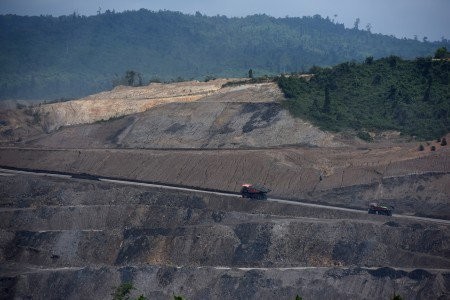Popular Reads
Top Results
Can't find what you're looking for?
View all search resultsPopular Reads
Top Results
Can't find what you're looking for?
View all search resultsEast Kalimantan's coal fiasco and the victory of the state
The dispute between the Indonesian government and Churchill Mining over the 35,000-hectare coal mine site that was claimed to be the seventh-largest undeveloped coal mining asset in the world, started in 2010.
Change text size
Gift Premium Articles
to Anyone
T
he wait is over. After more than four years, the International Centre for Settlement of Investment Disputes (ICSID) finally came to a decision in favor of the Indonesian government regarding the dispute over a coal-mine concession located in East Kutai Regency, East Kalimantan. On Dec. 6 the international arbitration body threw out the demand by British miner Churchill Mining Plc., and its Australian subsidiary, Planet Mining Pty. Ltd., which sought US$1.3 billion in compensation from the Indonesian government.
The dispute between the Indonesian government and Churchill Mining over the 35,000-hectare coal mine site that was claimed to be the seventh-largest undeveloped coal mining asset in the world, started in 2010. The then head of East Kutai regency, Isran Noor, granted the concessions to an Indonesian firm, PT. Nusantara Group, and revoked the concessions granted in 2007 by his predecessor to PT. Ridlatama, another Indonesian company that later in 2008 made a deal to collaborate with Churchill Mining, selling 75 percent of its shares to the British company.
The revocation by the district head was based on two reasons, i.e. illegal logging activities conducted by Churchill Mining in the concession area and the transfer of shares from Ridlatama to Churchill without the knowledge of the district head, which was deemed illegal. Isran Noor argued that the license granted to Ridlatama for the mine site was an Ijin Usaha Pertambangan (IUP) or a mining license that was issued only for a domestic company based on the 2009 Mining Law. Isran’s decision, therefore, was supported by then president Susilo Bambang Yudhoyono.
Churchill Mining along with Planet Mining, which opposed the revocation, took the case to the ICSID in 2012 and sought $2 billion in compensation from the government, after they failed to sue the district head through the State Administrative Court as well as the Supreme Court.
The companies argued that the Indonesian government had violated the bilateral investment treaties between Indonesia and the UK, and between Indonesia and Australia. The lawsuit was then reduced by the plaintiffs to $1.3 billion in 2014.
The final decision of the ICSID tribunal to reject all the claims by the British and Australian companies was based on the fact that the 34 documents that were used by the companies to claim the coal mine site were all counterfeit. The tribunal contended that neither companies conducted proper due diligence for their investment. The tribunal also ordered the companies to pay a total of $8.65 million compensation to the Indonesian government, and an additional $800,000 for ICSID administration fees that had been paid by the Indonesian government.
The coal-mine fiasco in East Kalimantan has demonstrated how a transnational company with huge capital and extensive political and business networks failed to exert its putative structural power over the Indonesian government. Business structural power refers to the power of business in influencing government policy and threatening the government if the latter cannot fulfill the required conditions for investment that meet business expectations.
Nevertheless, unlike investment in manufacturing industry, which is more mobile, the structural power of business does not necessarily affect the investment dynamics surrounding natural-resource extraction such as coal mining, which is highly lucrative, but not very mobile in nature. Such fixed assets in a particular location will hand power back to the government, which possesses the legal ownership of the location as well as the assets.
In the struggle against Churchill Mining, the Indonesian government was confident that the revocation of the mine concession would not affect the whole investment climate or discourage other investors from investing in the country. This strong leverage was not merely because of the lucrative nature of coal resources, but also due to the scarcity and immobility of the resources, and the geographical advantage of coal sites in East Kalimantan in terms of proximity to potential international markets, such as China and India.
The fact that the four-year dispute eventually ended up in a victory for the Indonesian government, is historic, as the government has very rarely won in disputes at the international arbitration level, not to mention receiving compensation. The Indonesian government has suffered too many losses in international lawsuits, including the huge loss in the dispute between Pertamina and Karaha Bodas in the early 2000s that cost the government hundreds of millions of dollars and the confiscation of government assets overseas.
As such, this victory will boost the government’s confidence in countering international lawsuits by multinational companies.
Investing in the coal sector today may not be as attractive and as profitable as it was a few years ago, because of the substantial decline in coal prices in international markets in recent years.
Nonetheless, the dispute over the East Kutai coal mine concession provides several important lessons. For foreign investors, this case provides the lesson to take extra careful measures before committing to a massive investment, particularly in the mining sector.
For local governments, the case also provides the lesson to take more careful measures before granting a mining concession to an investor, among others by conducting thorough investigations and setting prudent requirements.
As for the lessons for the central government, the devolution of authority to district governments in issuing mining licenses and generating their own revenues is supposed to be followed by sufficient control over the implementation of good governance at the local level. This must entail sufficient empowerment and strengthening of the local government capacity in creating a favorable investment climate and dealing with investors.
Otherwise, the central government efforts to attract greater investment through the various economic policy packages will never be effective, or may even create problems not only for investors, but also for the local governments themselves, as well as their communities.
---------------
We are looking for information, opinions, and in-depth analysis from experts or scholars in a variety of fields. We choose articles based on facts or opinions about general news, as well as quality analysis and commentary about Indonesia or international events. Send your piece to community@jakpost.com. For more information click here.









